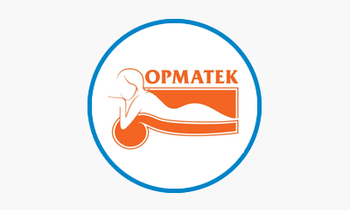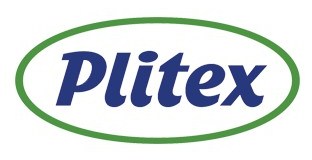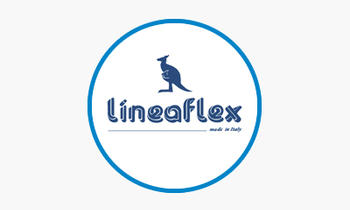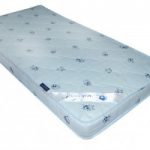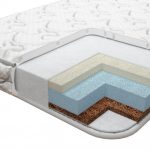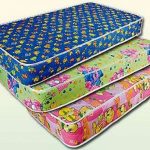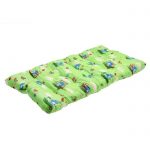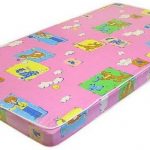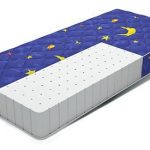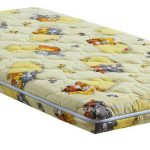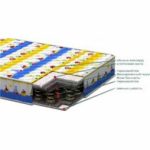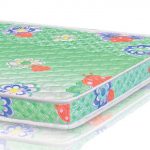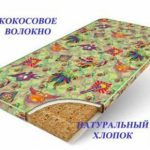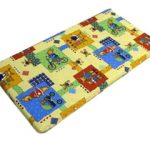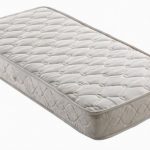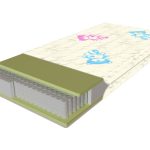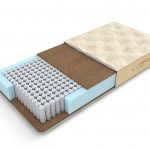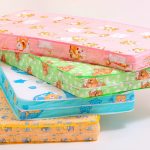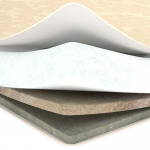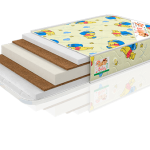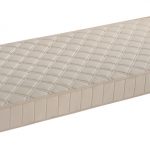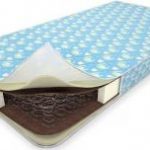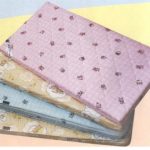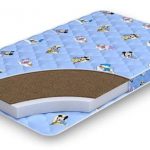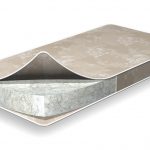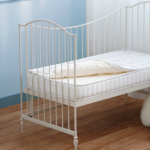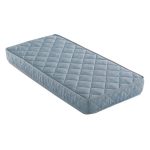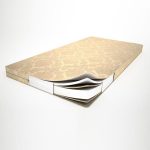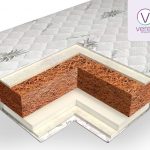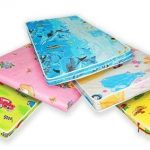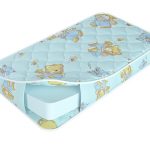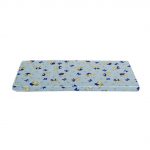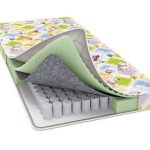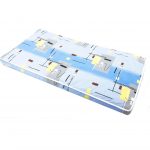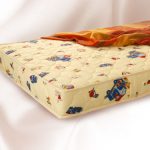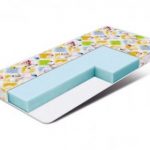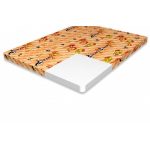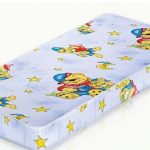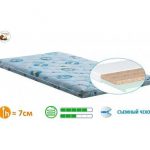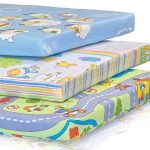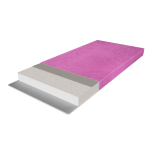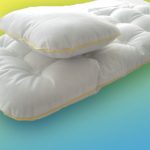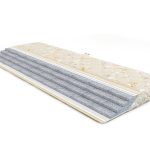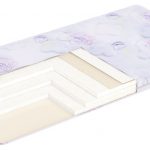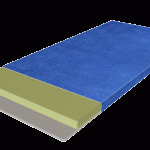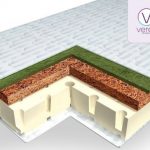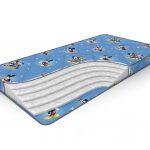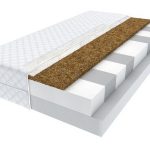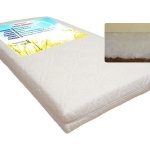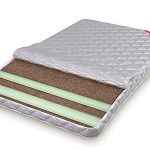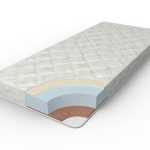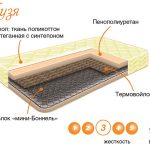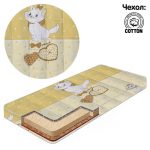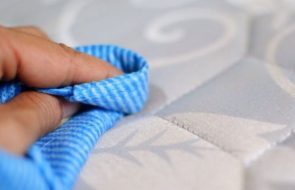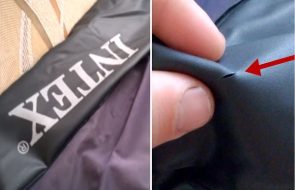When furnishing a nursery for a child, caring parents pay great attention to the choice of a bed and mattress. A children's mattress is the most important purchase for a child's health. But when choosing, many questions arise. And so you want to look at a mattress model so that your favorite princess and the pea or prince will be comfortable, and at the same time, their health will be preserved.
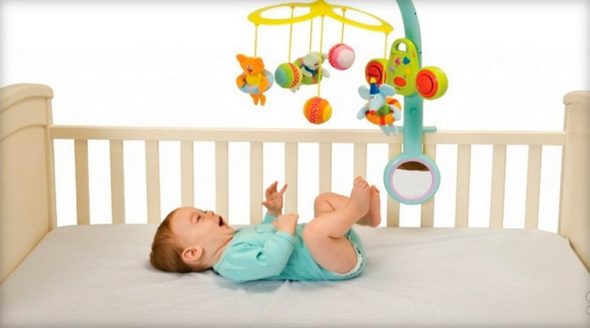
Content
- What kind of mattress should you choose for a child from 0 to 17 years old?
- Criteria for choosing a mattress
- Double-sided mattresses "winter-summer", their advantages
- Spring and springless mattresses
- Cotton and foam mattresses
- Innovative, hypoallergenic children's mattresses
- Coconut mattresses for children
- Manufacturers of mattresses for children
- Video: How to choose a children's mattress - Dr. Komarovsky
- Photos of children's mattresses of different firmness, made of different materials and with different fillings:
What kind of mattress should you choose for a child from 0 to 17 years old?
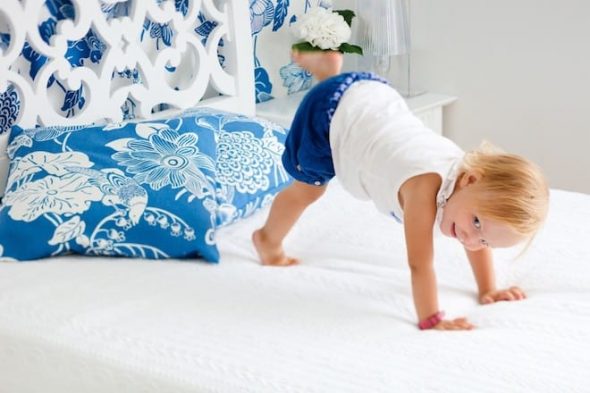
A mattress for children is the main component on which beneficial sleep depends, and sleep is sacred. According to pediatricians, a newborn baby sleeps peacefully for at least sixteen hours a day. For 3-5 years old, sleep lasts 11-13 hours. At the age of 7-17 years, the duration of sleep is 8-13 hours. Therefore, the main thing is to study the quality of the mattress before making an emotional purchase. You need to look not at the appearance, but at what is inside. In addition, in the first years of life, children's spinal column is formed, so it is so advisable to choose from a rather large offer from manufacturers an impeccable mattress for a newborn child and as he grows up in the future. It is valuable to know that certification of mattresses for children in Russia has not yet been created. Therefore, it is advisable for parents to take into account the selection criteria when buying this product.
Criteria for choosing a mattress
Parameters and thickness
It should be appropriate for the size of the crib and age. The thickness of the mattress for a newborn baby is 7 - 12 cm, no more.
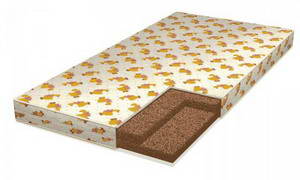
This is taken into account to ensure greater protection for the baby. As the baby grows, from three years of age, the thickness increases to 20 cm. The principle of proportionality of the mattress and the crib is also maintained. Mattresses for children and teenagers have standard parameters:
1) 120*60 cm – for 0-1 years
2) 140*70 cm – for 1-5 years
3) 160*80 cm – for 5-11 years
4) 190-200 cm L, 80-130 cm W – for teenagers
Rigidity
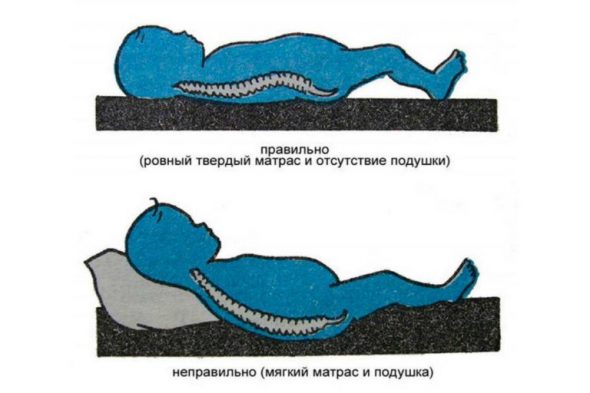
Since children are born with an unformed rectilinear, non-S-shaped curvature of the spine, and it develops only by the age of three, it is important to find a mattress with the required rigidity. Doctors, of course, forbid a child to sleep on a soft bed until the age of one in order to prevent curvature of the vertebrae. It is better to choose a hard or moderately hard mattress for a child during this period of life. There are double-sided mattresses that differ in the types of rigidity on each side. Until one year, the baby safely snores on the hard part, and from one and a half years after turning the bed over, he sleeps on the softer side. Rigidity and moderate rigidity are recommended for children up to seven years and older, such a mattress will not harm, but will help to form a beautiful posture and strong bones. From the age of seven, an orthopedic mattress is already great.
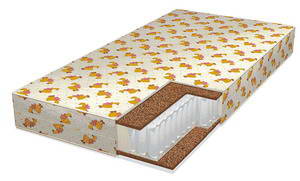
Fillers
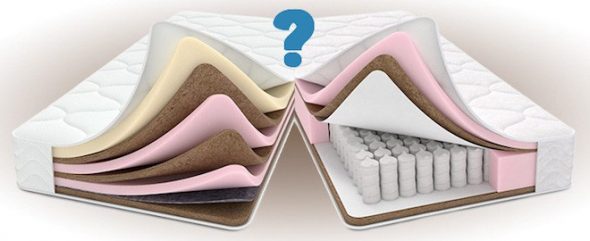
Fillers provide rigidity, eco-friendliness, comfortable sleep and satisfaction with the mattress. Contrary to popular belief, a completely natural filler composition is not needed. Allergies are provoked by natural components. The best option would be a combined type of mattress. For example, coconut coir with latex or foam. One that can breathe and not contribute to allergies. It is necessary that the filler does not emit harmful vapors. In this segment, the following fillers are known: cotton, latex, holofiber, flax, wool, foam, coconut coir. But among them there are those very natural, allergenic components. Wool, for example. Such materials as felt, wood shavings, straw after several leaks can rot and be destroyed. Coconut coir rolls over time, forming a bumpy surface, or, if appropriate storage conditions are not met, can rot and emit resins. All this should be taken into account when choosing.
Impregnations
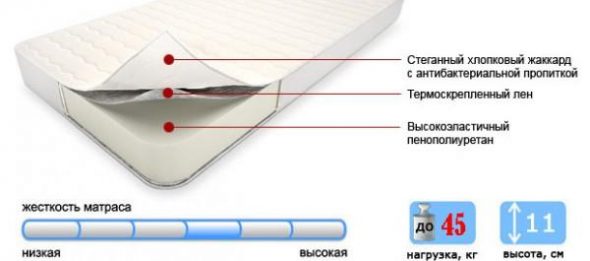
It will be incredibly beneficial for the child and even necessary according to standards if the cover and filling are treated with special impregnations, such as antimicrobial, antifungal, anti-mite, dustproof, fireproof. This information is indicated on the packaging, the label of the mattress for the child.
Surface
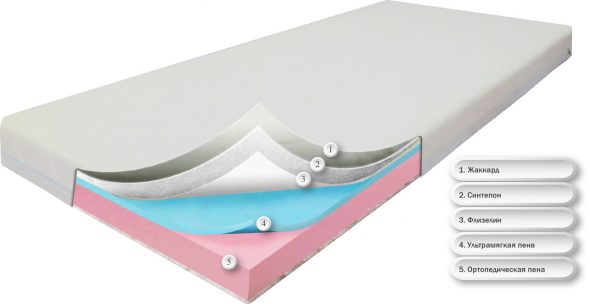
If you need to choose a mattress for your child, you should take a closer look at its surface. Inexpensive models have covers made of simple and weak fabrics that tear easily. For example, chintz. The best mattress cover is considered to be jacquard, which consists of a mixture of cotton and synthetics. Such a cover will last much longer.
Advice: it is also worth buying a mattress pad and a waterproof diaper. These products will provide additional protection from dust and leaks. The mattress pad is made of a breathable membrane, when the child wets himself, the liquid will not leak, but air will pass through the breathable membrane. It would be good to wash the mattress products once a week. The mattress is regularly vacuumed.
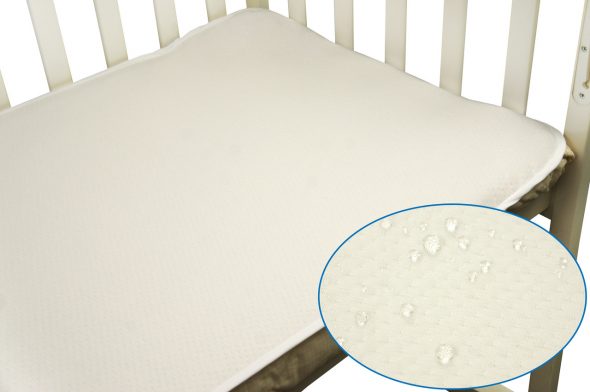
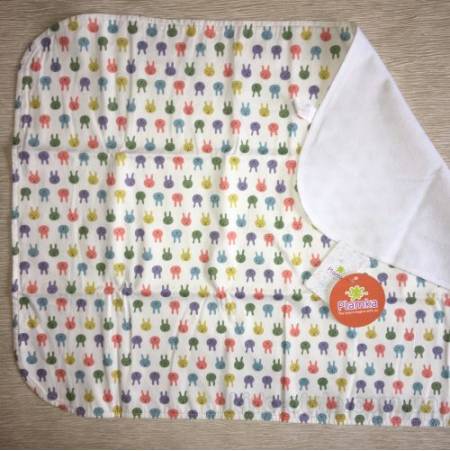
Double-sided mattresses "winter-summer", their advantages
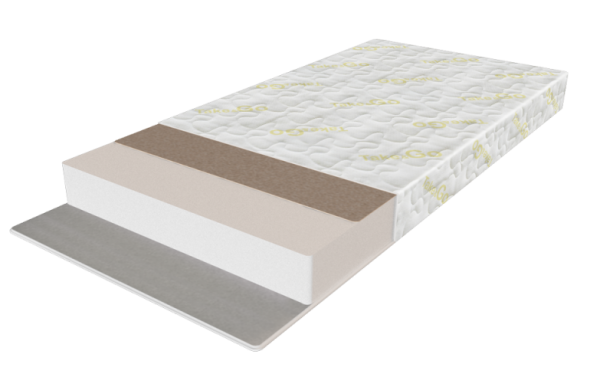
A pragmatic solution when choosing is a double-sided mattress. One side of which is made of insulated materials, and the other of cooler, but well-breathable materials. The winter part is made of wool. It perfectly repels moisture, and the insulating components perfectly retain heat. Jacquard is better suited for the summer side. It allows air to pass through, has a non-slip surface, and is moisture-resistant. Two fillers usually make up combined winter-summer mattresses. In the winter side - latex. In the summer part, coconut coir is used. Versatility is the main advantage of these mattresses. In such models, the sides differ in the degree of surface hardness. When the baby grows up, and it is uncomfortable for him to sleep on the hardness of the coconut, the mattress can be turned over to an elastic surface made of latex.
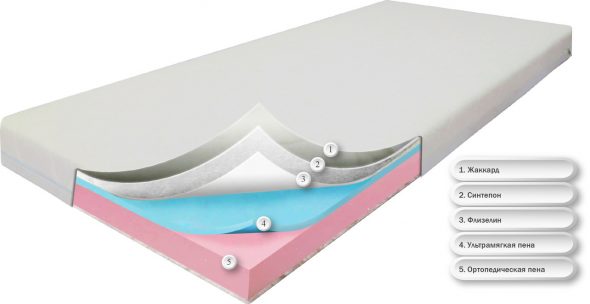
Spring and springless mattresses

Sleeping children on a spring surface is not the best option. The reason for this is the vibrations of the springs, which negatively affect the child's body. During the period of body growth up to twenty-five years, it is best to sleep on a mattress without springs. Then you can choose a spring, orthopedic mattress, since the skeletal system has formed, and no vibration of the springs affects it anymore. During the period of body growth, a tight and hard surface will be a smart choice. It suits the developing skeleton and prevents diseases of the musculoskeletal system. Another advantage of a springless children's mattress will be its stable endurance of such a children's activity as jumping on the crib.
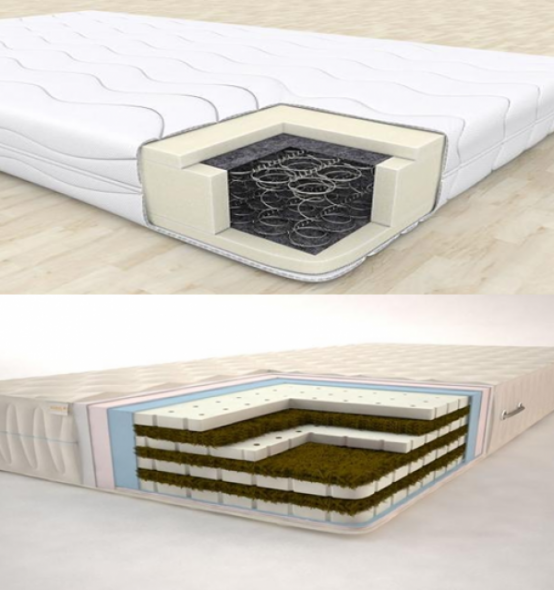
But among the models with springs, it is worth distinguishing between children's mattresses with a dependent spring block and with an independent spring block. The difference between them is in the connection of the springs in the form of blocks between themselves. Classic springs in mattresses do not provide orthopedic efficiency and are preferably not used in children's beds. An independent spring block in mattresses makes them orthopedic, but it is not recommended to sleep on them at a young age. For teenagers, a mattress with an independent spring block will support the spine, evenly distribute the load and give a wonderful orthopedic effect, but use is mandatory with an emphasis on moderate rigidity. Springless models, for medical reasons, are intended for teenagers suffering from diseases of the spinal column, musculoskeletal system, and circulatory disorders.
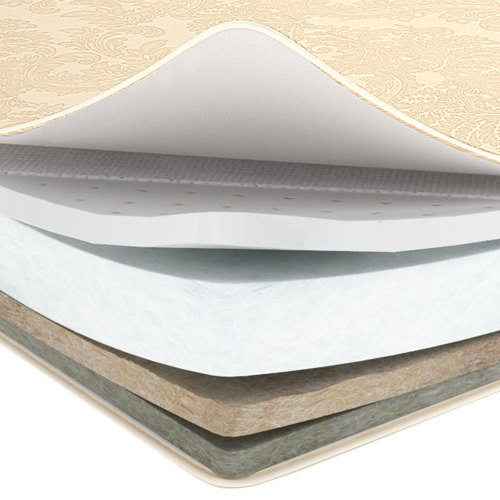
Cotton and foam mattresses
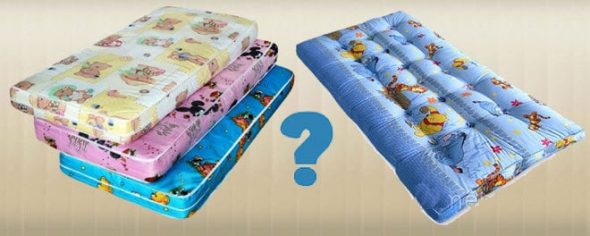
A few words about cotton models of mattresses for children's sleep. These mattresses are of rather low quality and not the best, outdated solution. They can undermine the health of not only a child, but an adult even with short-term use. This mattress quickly absorbs water, unpleasant odors, dries for a long time, loses shape, forming lumps inside. There are also foam models of mattresses. It is also not recommended for children to sleep on such products - due to their softness, they do not create the necessary requirements for the child in terms of rigidity to the sleeping surface. They do not provide the necessary support for the spine and comfortable sleeping conditions, it is better to refuse such mattresses. As a result, curvature of the spine and nervousness occur.
Innovative, hypoallergenic children's mattresses
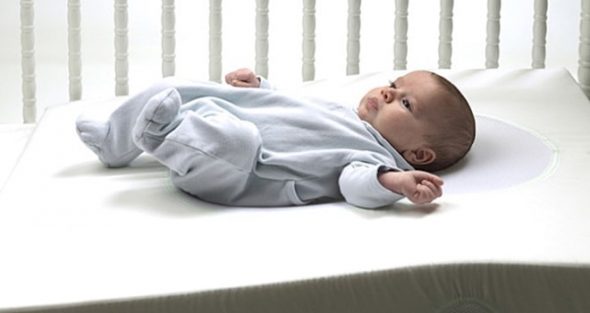
Advanced manufacturers already offer models of such mattresses. Such children's mattresses are equipped with unique filters, which are a scientifically proven barrier against mites, bacteria, dust, mold, and other allergens. The cover is made of soft, tactilely pleasant, stain-resistant textiles, which reliably protects the insides from moisture and possible clogging. Thermal seams completely eliminate the possibility of allergens and pathogens getting inside through the connecting elements. And such a children's mattress breathes due to unique filters. The pores of the filters are so tiny that bacteria and even viruses have absolutely no chance of getting inside. But this allows for excellent circulation of clean air. In addition, due to the fact that the cover and filter do not allow liquid inside, bedding does not require special care. It is simple and comes down to simply wiping the surface with a clean cloth with a warm soapy solution. It will take a few minutes for the surface to become dry. The filler of the product is the highest quality foam. These models are also usually designed with two-sided rigidity. Such mattress models are excellent protection for children with dust allergies, bronchial asthma, as well as for everyone who cares about proper sleep hygiene and the health of their child.
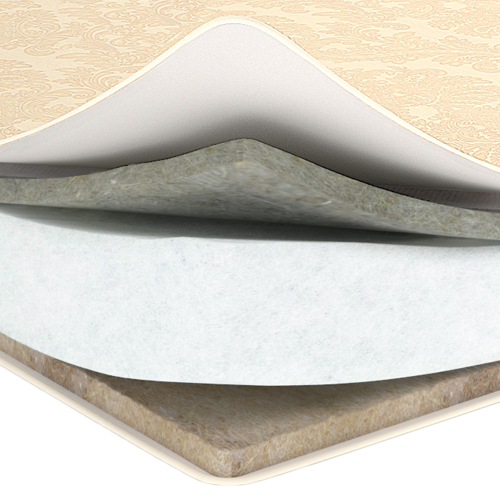
Coconut mattresses for children
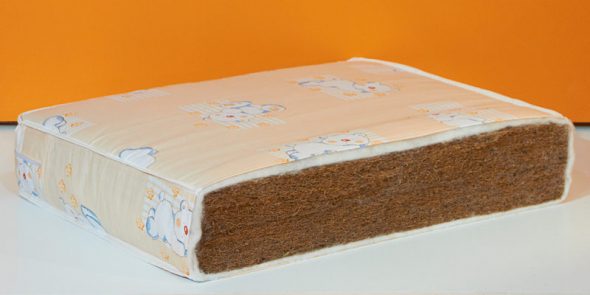
Latexed coconut coir is used in so-called coconut mattresses. This type of mattress modifications is distinguished by an increased level of rigidity, intended for children of all ages. Coconut coir (coconut) is a material of organic origin. Coir is obtained from the coconut palm nut by separating the fibers. After soaking in water for three hundred days and then thoroughly drying in the sun, the fibers are tamped down, saturated with latex to give elasticity. The output is products that are then used in the manufacture of mattresses. In mattresses for children from 3 years old, coconut is used, as a rule, in a combined form together with latex. It is also considered a suitable filler for a newborn's mattress. The natural, hypoallergenic, breathable component of coconut coir gives firmness, rigidity, durability to children's mattresses.
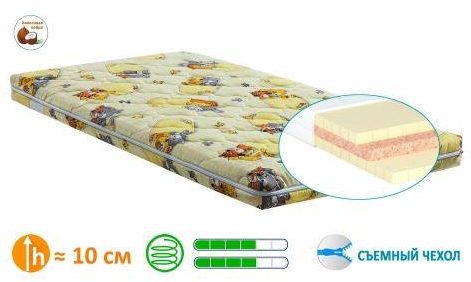
Manufacturers of mattresses for children
When choosing and buying the best mattress for children, it is worth paying attention to the unconditional reputation of manufacturers, proven over the years and supported by positive customer reviews.
- Askona (Russia-Sweden) orthopedic mattresses for children.
Askona children's mattresses are designed on the basis of a bonnel spring block or monolithic blocks - BabySleep (Russia-Italy) mattresses and pillows for children
- Ormatek (Russia) children's orthopedic mattresses.
The Ormatek company has a good reputation among owners of children's and adult mattresses. - DreamLine (Russia) double-sided mattresses, production of non-standard models.
- Plitex (Russia) mattresses for newborns
The Belarusian company Plitex is one of the leading manufacturers of children's mattresses and bed linen in the CIS - Lineaflex (Russia-Italy) orthopedic mattresses for children
LineaflexL is an Italian company specializing in the production of anatomical mattresses - MaterLux (Italy) mattresses, bedding for children
All MaterLux products are distinguished by their very high quality of execution.


